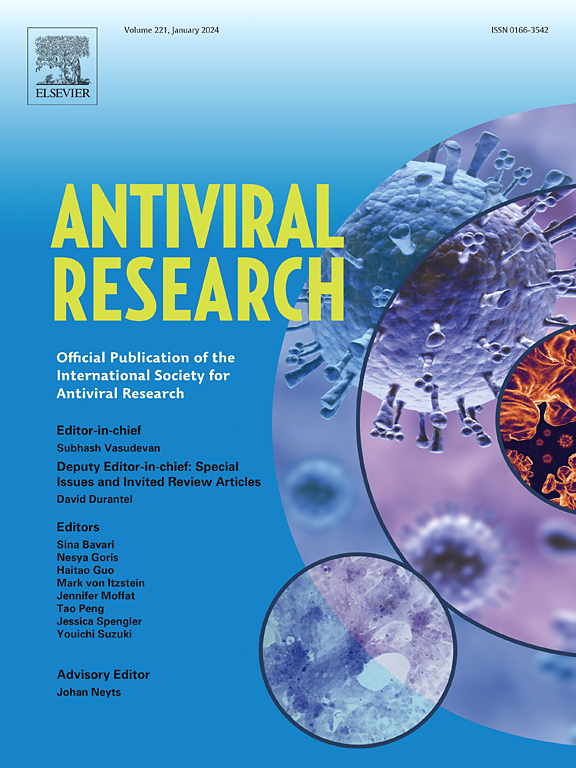核苷类似物抗湿地病毒感染的效果。
IF 4
2区 医学
Q1 PHARMACOLOGY & PHARMACY
引用次数: 0
摘要
湿地病毒(WELV)是一种新发现的与克里米亚-刚果出血热病毒(CCHFV)在系统发育上相关的正形鼻病毒,最近已被证明可引起人类感染。部分感染WELV的患者通常表现为发热性疾病,并伴有出血和神经系统症状。目前,还没有报道显示治疗WELV的有效治疗药物。在这项研究中,我们评估了五种核苷类似物的抗welv功效:四种临床批准的药物——利巴韦林、瑞德西韦、莫诺匹拉韦和索非布韦;还有一个临床候选4'-氟吡啶。利巴韦林和4′-氟吡啶对体外WELV复制有较强的抑制作用。Remdesivir和molnupiravir在Huh7细胞中表现出有限的抗病毒活性,而在Vero细胞中没有,而索非布韦没有表现出抑制作用。利用致死性免疫功能小鼠感染WELV模型,我们发现口服相对低剂量的利巴韦林(25mg /kg/天)或4'-氟吡啶(2.5 mg/kg/天)通过降低组织中病毒滴度和减轻病理损伤显著降低WELV感染小鼠的死亡率。这种治疗策略即使在感染后2至4天开始也保持显著的疗效。此外,我们在WELV L蛋白的c端区发现了突变G3033R和A3756V,这可能与病毒对利巴韦林和4'-氟吡啶的耐药性有关。该研究揭示了不同核苷类似物的不同程度的抗WELV功效,并确定4'-氟吡啶是一种有希望的治疗候选药物,利巴韦林是WELV感染的优先治疗选择。本文章由计算机程序翻译,如有差异,请以英文原文为准。
Effectiveness of nucleoside analogs against Wetland virus infection
Wetland virus (WELV), a newly identified Orthonairovirus phylogenetically related to the Crimean–Congo hemorrhagic fever virus (CCHFV), has recently been shown to cause human infections. A portion of patients infected with WELV usually present with febrile diseases, accompanied by hemorrhagic and neurological symptoms. Currently, there are no reports demonstrating effective therapeutic drugs for the treatment of WELV. In this study, we evaluated the anti-WELV efficacy of five nucleoside analogs: four clinically approved drugs-ribavirin, remdesivir, molnupiravir, and sofosbuvir; and a clinical candidate 4′-fluorouridine. Ribavirin and 4′-fluorouridine strongly inhibited WELV replication in vitro. Remdesivir and molnupiravir showed limited antiviral activity against WELV in Huh7 cells but not in Vero cells, while sofosbuvir did not exhibit inhibitory effects. Utilizing a lethal immunocompetent mouse model of WELV infection, we found that oral administration of relatively low doses of ribavirin (25 mg/kg/day) or 4′-fluorouridine (2.5 mg/kg/day) significantly reduced the mortality of WELV-infected mice by decreasing viral titers in tissues and alleviating pathological damage. This treatment strategy retained significant efficacy even when initiated 2–4 days after infection. Additionally, we identified mutations G3033R and A3756V in the C-terminal region of the WELV L protein, which may be associated with viral resistance to ribavirin and 4′-fluorouridine. This study revealed varying degrees of anti-WELV efficacy among different nucleoside analogs and identified 4′-fluorouridine as a promising therapeutic candidate and ribavirin as a priority treatment option for WELV infection.
求助全文
通过发布文献求助,成功后即可免费获取论文全文。
去求助
来源期刊

Antiviral research
医学-病毒学
CiteScore
17.10
自引率
3.90%
发文量
157
审稿时长
34 days
期刊介绍:
Antiviral Research is a journal that focuses on various aspects of controlling viral infections in both humans and animals. It is a platform for publishing research reports, short communications, review articles, and commentaries. The journal covers a wide range of topics including antiviral drugs, antibodies, and host-response modifiers. These topics encompass their synthesis, in vitro and in vivo testing, as well as mechanisms of action. Additionally, the journal also publishes studies on the development of new or improved vaccines against viral infections in humans. It delves into assessing the safety of drugs and vaccines, tracking the evolution of drug or vaccine-resistant viruses, and developing effective countermeasures. Another area of interest includes the identification and validation of new drug targets. The journal further explores laboratory animal models of viral diseases, investigates the pathogenesis of viral diseases, and examines the mechanisms by which viruses avoid host immune responses.
 求助内容:
求助内容: 应助结果提醒方式:
应助结果提醒方式:


